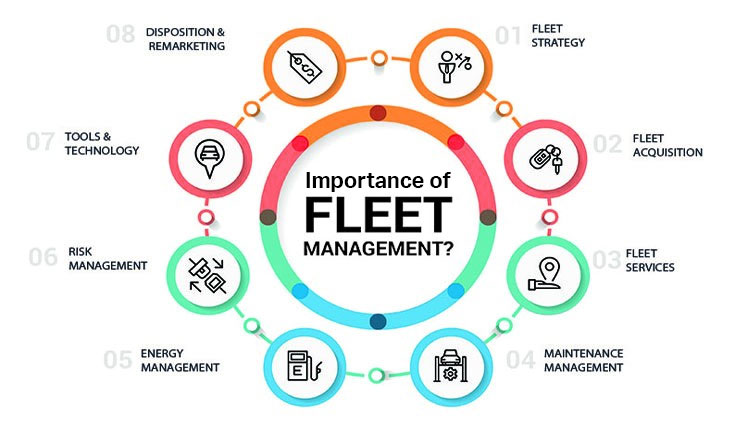The trucking industry, a vital cog in global supply chains, is under increasing pressure to reduce its environmental impact. While the transition to electric vehicles and alternative fuels is gaining traction, numerous strategies can be implemented today to make fleets more sustainable.
This article delves into 15 practices adopted by eco-conscious fleets, showcasing their commitment to environmental responsibility.
Optimizing Vehicle Performance
- Researching and Adopting Latest Technologies: Leading fleets stay at the forefront of technological advancements, continuously evaluating new products and solutions to enhance sustainability. This can include exploring electric vehicle options, advanced telematics systems, and fuel-efficient components like aerodynamic add-ons, tire management systems, and engine optimization technologies.

Purchasing Fuel-Efficient Trucks: Investing in modern, fuel-efficient trucks with low emissions is a cornerstone of green fleet operations. By maintaining a young fleet and selecting models with advanced features like hybrid powertrains or regenerative braking, companies can significantly reduce their environmental footprint.
Vehicle Specification Optimization: Tailoring truck specifications to specific operational needs is crucial for maximizing fuel efficiency. Factors such as engine size, transmission type, aerodynamics, and tire selection are carefully considered. For example, downsizing engines, selecting low-rolling-resistance tires, and optimizing axle ratios can yield substantial fuel savings.
Enhancing Aerodynamics: Reducing aerodynamic drag can yield substantial fuel savings. Green fleets often implement aerodynamic add-ons like cab extenders, side fairings, and trailer skirts. Additionally, using aerodynamically optimized trailer designs and gap reducers can further improve fuel efficiency.
Minimizing Idle Time: Unnecessary idling consumes fuel and increases emissions. Top fleets aiming for sustainbility employ various strategies, including auxiliary power units, battery-powered cab HVAC systems, solar panels, and driver training to minimize idle time. Implementing idle reduction policies and using telematics to monitor idle time can also be effective.
Tire Management: Proper tire maintenance and selection significantly impact fuel efficiency. Green fleets should focus on maintaining optimal tire pressure, utilizing fuel-efficient tire models, and implementing tire retreading programs. Regular tire inspections, rotations, and alignments can also contribute to fuel savings and tire longevity.

Streamlining Operations Improving Freight Efficiency: Maximizing the payload per trip is essential for reducing fuel consumption and emissions. Techniques include optimizing load distribution, using lightweight trailers, and exploring opportunities for intermodal transportation. Load consolidation, backhauling strategies, and route planning can also help improve freight efficiency.
Route Optimization: Advanced route planning systems help minimize empty miles and fuel consumption. Invest in sophisticated software such as Eagle-IoT to optimize delivery routes based on factors like traffic conditions, weather, load weight, and fuel prices. Real-time traffic data and predictive analytics can further enhance route efficiency.
Utilizing Alternative Fuels: When feasible, incorporating alternative fuels like biodiesel, renewable diesel, natural gas, or renewable natural gas into the fleet can reduce carbon emissions. Fleets should also explore hydrogen fuel cell technology as a long-term option.
Preventive Maintenance: Regular vehicle maintenance is crucial for optimal fuel efficiency and engine performance. Fleets should adhere to strict maintenance schedules, invest in diagnostic tools, and implement predictive maintenance programs to identify potential issues early on. Well-maintained vehicles also tend to have lower emissions.
Building a Sustainable Infrastructure
- Greening Facilities: Reducing the environmental impact of fleet facilities is a key component of overall sustainability. This includes implementing energy-efficient lighting, HVAC systems, and water conservation measures. Additionally, installing solar panels or wind turbines can generate renewable energy on-site.
- Recycling and Waste Reduction: Prioritize recycling programs for various materials, including paper, cardboard, plastic, oil, and tires. Fleet Management Companies should also adopt waste reduction strategies to minimize their environmental footprint. Implementing waste management systems, composting organic waste, and purchasing recycled products can further contribute to sustainability efforts.

Evaluating Zero-Emission Vehicles (ZEVs): As technology advances, fleets are increasingly exploring the adoption of electric vehicles. This includes conducting feasibility studies, piloting electric trucks, and investing in charging infrastructure. Government incentives, charging network expansion, and battery technology improvements are key factors influencing ZEV adoption.

People and Culture
Driver Training and Incentives: Empowering drivers to adopt fuel-efficient driving habits is essential. To make your fleet green, provide comprehensive training programs, including eco-driving techniques, vehicle systems, and fuel-saving tips. Incentive programs, such as fuel efficiency bonuses or rewards, can further motivate drivers to optimize their performance.
- Fostering a Sustainability Culture: Creating a company-wide commitment to sustainability is crucial for long-term success. Organizations should involve employees in sustainability initiatives, set clear goals, and track progress to create a culture of environmental responsibility. Employee engagement, communication, and education are essential for building a strong sustainability culture.
By embracing these 15 practices, eco-conscious fleets can significantly reduce their environmental impact and improve operational efficiency.
Eagle-IoT can be a valuable tool for fleets looking to enhance their sustainability efforts. With advanced telematics capabilities, Eagle-IoT provides actionable insights into vehicle performance, fuel consumption, driver behavior, and route optimization. By leveraging data-driven intelligence, fleets can identify areas for improvement, reduce emissions, and achieve their sustainability goals.
Contact us to learn more about how Eagle-IoT can help your fleet become more sustainable.


